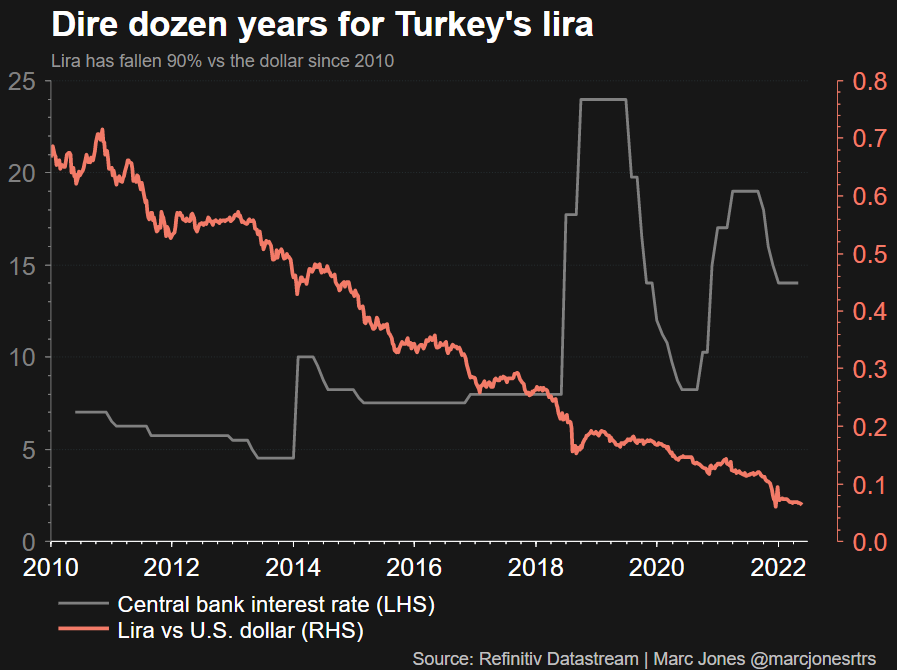On Friday, 3 June, the Turkish lira dropped to its lowest level since the December 2021 crash, to 16.53 vs USD, despite attmepts by the Central Bank to stop the slide. TL’s weakness is not as bad as 2021, but after three months of relative calm, it is becoming manifest, once again. Turkish exprts claim, Central Bank has only $30 bn in liquişd FX reserves to defend the currency, as doemsitc deamdn soars on the back of soaring inflation, while high energy prices are upping thei mprot bill.
What do international commentators think about TL’s fate?
The Capital.com writes “lira has lost another 15% year to date against the US dollar after plunging by 46% in 2021, driven by President Tayyip Erdogan’s unconventional views on addressing inflation by cutting interest rates rather than lifting them.
Is there a trading opportunity for foreign exchange (forex) investors in going long or short on the lira following the latest fall against the dollar? In this article we look at the lira’s performance and analysts’ expectations.
Monetary policy drives lira to collapse
The Turkish lira started 2021 at around 7.37 against the US dollar and steadily shed value throughout the year. The USD/TRY rate fell to 9.69 at the end of October, and then dropped to a record low, reaching 16.42 on 12 December.
“The seeds for the ongoing lira crisis were sown when CBT governor, Sahap Kavcioglu, launched an unconventional monetary policy experiment, attempting to cure high inflation by lowering interest rates. They were not sown by Turkish households spontaneously deciding to move towards FX deposits instead of their domestic currency,” wrote Tatha Ghose, FX and emerging markets (EM) analyst at Germany’s Commerzbank in a recent TRY analysis.
“Cutting rates is President Tayyip Erdogan’s now familiar view of how monetary policy should work. CBT attempted to find conventional justifications for rate cuts, such as inflation was high because of transitory factors and that core inflation was lower than observed headline inflation. But such arguments do not make sense because even the core inflation rate is many multiples of the inflation target, and this has been the case for a decade (nothing related to recent transitory factors) – other central banks would not dream of lowering interest rates against such a backdrop,” Ghose added”.
Turkey’s central bank held the country’s key interest rate unchanged at 14% on Thursday, 26 May, having cut rates by 500 basis points since September as inflation hit 20-year highs. The currency crisis is now coinciding with rising prices for energy and other commodities driven by the Russia-Ukraine conflict, further exacerbating inflation by driving up the cost of Turkish imports.
ING: TL victim to Ukraine War
“All in all, we see a pronounced TRY weakness in recent weeks and pressure on reserves with a US$7.4bn decline (in gross reserves) despite continuous FX purchases through the FX-protected deposit scheme and FX surrender requirements. Inflation, on the other hand, maintained a rapid uptrend with risks tilted to the downside given the broad-based deterioration in price dynamics with a largely supportive policy framework and the Russia/Ukraine war pressuring import prices,” Muhammet Mercan, chief economist for Turkey at Dutch bank ING, wrote on Thursday.
Turkey’s Slow-Motion Currency Crash
“While the current outlook requires a significantly tighter monetary policy stance, the CBT does not signal a shift in the near term, remaining mute again in May and signalling the continuation of the same policy line.”
Will the Turkish lira go up or down?
The value of the lira is weakening at a time of particular strength in the value of the US dollar. The US dollar index (DXY), which measures the dollar against a basket of currencies, climbed to a near 20-year high on 12 May.
The USD/TRY exchange rate moved to the 11 level in late December as the lira attempted to rebound from the crash, but has resumed its decline in 2022, with the pair returning to the record 16 level.
SEB/Per Hammerlund: A toxic brew for TL
Per Hammarlund, chief EM strategist at Swedish bank SEB, wrote on 11 May that “rising US and global interest rates in combination with slowing growth is a toxic brew for EM risk appetite in general and for Turkey in particular… With elections looming in June 2023, Erdogan will prioritize growth over inflation, which will keep building the pressure on the lira.”
Erdogan’s Lethal Economic Legacy
“Turkey is not a dead certainty for a big crisis but the odds of one are a long, long way from zero,” said Aberdeen fund manager Kieran Curtis. “They are at risk of losing control of the situation”.
JPMorgan’s Zafar Nazim said it is “essential” to sustain depositors’ interest in this scheme (FX protected TL deposit scheme, KKM), amid deeply negative real rates. Ankara might therefore decide to let firms deposit more into KKM accounts and possibly offer new tax breaks – though that could create more problems, others believe.
“I don’t think it is sustainable. You cannot just offer anyone a payout to protect against currency weakness,” said Daniel Moreno, head of emerging markets debt at Mirabaud, which sold its last remaining Turkey bonds during last year’s turmoil.
“(Things) seem to be getting worse by the day. But Turkey is not going to go down without a fight.”
Follow our English language YouTube videos @ REAL TURKEY: https://www.youtube.com/channel/UCKpFJB4GFiNkhmpVZQ_d9Rg
And content at Twitter: @AtillaEng
Facebook: Real Turkey Channel: https://www.facebook.com/realturkeychannel/
